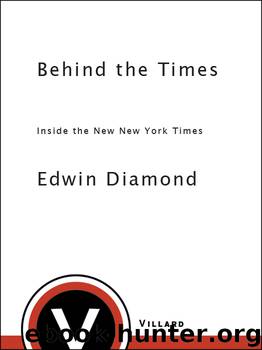Behind the Times by Edwin Diamond

Author:Edwin Diamond [Diamond, Edwin]
Language: eng
Format: epub
ISBN: 978-0-307-83337-2
Publisher: Random House Publishing Group
Published: 2013-04-10T04:00:00+00:00
3:45 P.M.
Albert Scardino, a reporter specializing in stories about the media, finally accepted that Tuesday would be a lost day for him. He had just returned from Amelia Island, a pleasant resort on the Florida-Georgia border, where he had participated in the Times’ Big Brother program. That was the newsroom’s somewhat mocking name for the Times’ latest corporate management venture. In 1987 the Times Company had designated Seymour Topping, a former Times foreign correspondent and later an assistant managing editor, to be director of editorial development for the company’s thirty-five regional newspapers. Topping was supposed to help sharpen the journalistic skills of the news staffs at the regional papers. He had the idea of inviting Times reporters and editors to speak on their specialties to regular gatherings of the little brothers (and sisters). The Times’ newspaper properties were located mostly in smaller towns with a heavy concentration in the South. Scardino once owned and edited a small weekly in Augusta, Georgia—and won a Pulitzer Prize for his editorial writings. He was invited by Topping to Amelia to speak on the topic of “enterprise reporting.”
Ordinarily, Amelia Island in February would be a welcome assignment for a transplanted Southerner, but a snowstorm hit Florida, bringing northern temperatures to the resort. Scardino faced rough weather on another front as well; the previous Big Brother speaker, an assistant editor on the metro desk, chose to talk about the Times’ coverage of the Tawana Brawley case. The editor described how the metro desk assigned no fewer than eight people for a good part of 1988 to investigate the story of the black teenager (Brawley had claimed she was abducted and raped by a band of white men, some of them law enforcement officers; the Times team presented evidence to demonstrate that her story was a hoax). As the metro editor reprised the Times’ handling of the case, a hand shot up. The questioner said he had to put out a paper every day, including Sundays, with a news staff of eight people. What possible relevance could the Brawley example have to his experience? Scardino was sympathetic. There is no way you can relate to the behemoth of the North, he told the little-brother editors when it was his turn to speak. “The Times is like the U.S. Post Office.”
Back in the newsroom on Tuesday, Scardino sprayed his desktop with Fantastik cleaner and swiped at it with a rag. Judith Miller was rejoining the paper as the new deputy editor for media, and she decided to set up shop in the cubicle until then assigned to Scardino. A former Times foreign correspondent and more recently a deputy news editor of the Washington bureau, Miller had been on leave to finish a book on the Holocaust (published in 1990 as One by One by One). Miller was now Scardino’s supervisor, and so he spent the day moving his files in order to turn over his desk to her. He was not a happy Timesman. The paper ran a feature under his byline called “Press Notes,” though not as regularly as he would have liked.
Download
This site does not store any files on its server. We only index and link to content provided by other sites. Please contact the content providers to delete copyright contents if any and email us, we'll remove relevant links or contents immediately.
The Vikings: Conquering England, France, and Ireland by Wernick Robert(79847)
Ali Pasha, Lion of Ioannina by Eugenia Russell & Eugenia Russell(40109)
The Conquerors (The Winning of America Series Book 3) by Eckert Allan W(37095)
The Vikings: Discoverers of a New World by Wernick Robert(36903)
Cecilia; Or, Memoirs of an Heiress — Volume 1 by Fanny Burney(32396)
Cecilia; Or, Memoirs of an Heiress — Volume 3 by Fanny Burney(31789)
Cecilia; Or, Memoirs of an Heiress — Volume 2 by Fanny Burney(31759)
Empire of the Sikhs by Patwant Singh(22931)
The Secret History by Donna Tartt(18793)
Hans Sturm: A Soldier's Odyssey on the Eastern Front by Gordon Williamson(18448)
Cat's cradle by Kurt Vonnegut(15129)
Pimp by Iceberg Slim(14275)
Sapiens: A Brief History of Humankind by Yuval Noah Harari(14189)
Talking to Strangers by Malcolm Gladwell(13163)
Norse Mythology by Gaiman Neil(13158)
Leonardo da Vinci by Walter Isaacson(13131)
4 3 2 1: A Novel by Paul Auster(12247)
Underground: A Human History of the Worlds Beneath Our Feet by Will Hunt(11992)
The Radium Girls by Kate Moore(11888)
